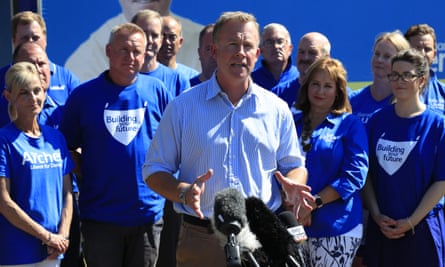The backlash has been sharp, as Tasmania’s Labor opposition leader, Rebecca White, must have known it would be.
When the Tasmanian opposition leader announced she would ban poker machines from pubs and clubs if she became premier it was a challenge to not just the Liberal government, but a company that is used to getting its way in the state.
The Sydney-based Farrell family has been a dominant presence in the island state since the late 1960s, when it was awarded a licence to turn the Wrest Point Riviera Hotel on the banks of Hobart’s River Derwent into Australia’s first casino.
The rights to build Launceston’s Country Club Casino followed a decade later; exclusive licensing rights for pokies in pubs and clubs came in 1993.
A string of lucrative deals with Labor and Liberal governments has made the Farrells incredibly wealthy. By 2015, according to the BRW rich family list, they were worth $463m, up $48m from the previous year.
Tasmanians lose $110m a year on gaming machines and about 2,000 are problem gamblers, mostly hooked on pokies.
In December, White surprised the state, and the gaming industry nationwide, with a promise to use the expiration of Federal Group’s exclusivity deed to force more than 2,300 pokies to be removed in five years. Tasmania would become the first state to get gaming machines out of hotels, and join Western Australia in restricting them to casinos.

The Liberal premier, Will Hodgman, promises a different change: an end to Federal Group’s monopoly outside casinos. Venues would be licensed directly, increasing the state’s tax take and revenue to pub owners. Critics noted there was nothing in the plan to stop Federal, which owns 12 large pokies’ pubs, just buying more.
Both policy shifts can be linked to David Walsh, the founder and owner of Tasmania’s leading tourist attraction, the Museum of Old and New Art. In September 2015, he publicly rejected a proposal that would have both extended Federal’s monopoly on pokies and granted MONA a licence to build a boutique casino for foreign high-rollers. Walsh, a professional gambler, threatened to abandon his casino plans if the monopoly continued. He launched a sustained attack on pokies, which he calls “granny-raping machines”. The conflict led to a parliamentary inquiry and lengthy public debate.
Tasmania has a long history of powerful and wealthy voices having an outsized influence on public policy. As the state begins a five-week campaign to a 3 March election, that tradition is on public display.
Federal Group chief Greg Farrell has warned the company would review its Tasmanian investments and consider legal action if Labor won. He launched an advertising campaign featuring 11 employees worried they could lose their jobs.
The state’s hospitality association claimed Labor is putting 5,000 jobs at risk while denying adults the right to choose how they spend their money, and backing a parallel “love your local” campaign.
Billboards calling for Hodgman to be returned have begun to appear on pubs.
On the other side, Guardian Australia understands Walsh has donated hundreds of thousands to an anti-gaming machine advertising blitz to be launched this week by advocacy group Bad Bets, which links pokies to suicide, domestic violence and political backscratching.
These are huge sums in the small Tasmanian advertising market, and may drown out other issues.
Prof Richard Eccleston, director of the University of Tasmania’s Institute for the Study of Social Change, says Labor is taking a risk.
“Given the politics and the history in Tasmania, and the stakeholders on both sides of the debate, it really is significant,” he says.
“Clearly, Federal hotels and the Tasmanian Hospitality Association are going to throw everything they can at the campaign and I think, given the national significance of Labor’s policy, it would be surprising if national operators weren’t involved because it’s a precedent they don’t want to see.”
Leanne Minshull, state director of the left-leaning Australia Institute, says Labor’s policy is an extraordinary break with the past. “It’s not just new Labor, it’s new Tasmania. It’s supported by Labor, the Greens and Jacqui Lambie. The Libs are holding Tasmania back on this issue.”
Polls suggest about 80% support for removing pokies from hotels, but views are mixed on whether it is a vote-changer. The gaming policies are, however, central to how the parties aim to define themselves: Labor as putting people first and being less tied to old mates; the Liberals as offering experienced leadership, being pro-business, not rocking the boat.
Economist Saul Eslake says pokies are probably not a first-order issue for most voters, though Labor may get credit for its bold stance. But he says claims that removing pokies from hotels would significantly damage the economy are baseless.
“Whatever the impact on employment is, if there is one, it is much less than what is claimed,” he says. “It assumes every job associated with pubs and clubs is under threat. That’s just nonsense.”
After 16 years in opposition, the Liberals returned to power in a landslide four years ago with 51.2% of the primary vote. Under Tasmania’s Hare-Clark system, in which five MPs are elected from each of five multi-member electorates, it translated to the Liberals having 15 seats in the 25-seat parliament. Labor was reduced to just seven, the Greens three.
It looks a large margin, but the small size of the parliament means the government can drop no more than two seats if it is to retain a majority. It is considered certain to lose at least one, in the north-west electorate of Braddon, where a favourable preference flow gave it four out of five seats last time. And polls suggest a tighter result than in 2014.

Comments (…)
Sign in or create your Guardian account to join the discussion